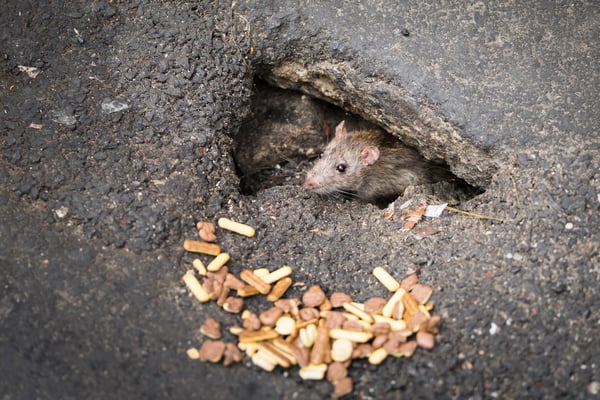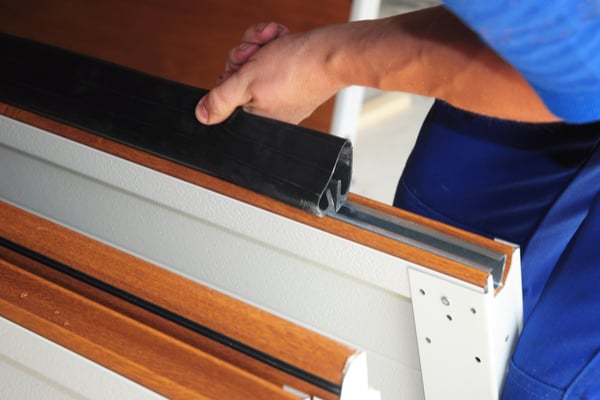If there’s one thing that’s obvious about rats, it’s that they’re doing very, very well. Rats live in great numbers everywhere, including anywhere humans live. It seems like no matter what happens, rats are an inescapable fact of life. But why is that? How is it that rats can actually survive so reliably?
Everyone’s had to deal with a rat problem at one point or another, but few people actually realize why. What are rats doing around your home? What do they want? How do they survive while they’re outside? Once they’re inside? Knowing a
What Do Rats Eat?
Believe it or not: rats are not picky. We know, shocker. The rodents will chow down on pretty much any food they can get their grubby little paws on. Outside, they feed on grain, seeds, nuts, berries, fallen fruit, animal byproducts, garbage scraps, or insects. The quantity of food is considerably more important to rats than its quality--think Remy’s family in Ratatouille. Rats horde food in nests or other hiding places so they can access it when they need it.
Despite their opportunistic nature, even rats have certain food preferences. First and foremost, they’re interested in large quantities of food they can access easily. They’d like nothing more than to sneak their way into whole packages of dry pantry food. Rats want to eat pretty much constantly, so they’ll look for the easiest way to do that. They also tend to target food they can break up into small, easily transported chunks they can horde.

How Do Rats Find Food?
Rats have an extremely keen sense of smell. In fact, over 1% of their DNA is devoted to odor detection. This sense of smell gives rats incredibly specific information about their environments. One way to think about it would be that rats smell the way we see color. The world’s smells are as diverse and informative to them as colors are to us. Again, think Ratatouille (what a helpful movie!).
Even possessed of such incredible natural skills, however, rats are still rats. They use their sense of smell… more or less how you’d expect. Rat’s noses give them an unerring understanding of the specific location and distance of all kinds of food. They can smell food through packaging, walls, or pantry doors! All rats have to do to access that food is follow their noses all the way to it. They can smell their way past obstacles and dangers while they’re at it.
How Do Rats Enter Homes?
Food gives rats both the desire to enter your home and the means. As rats “follow their noses,” they end up locating small gaps around your home. They find these gaps thanks to the air escaping from these gaps. Small holes around your windows, doors, and utility lines suck hot air from inside your home outside. As the suction carries hot air outside, it carries food smells with it.
Rats follow the smells wafting out of your home all the way to their points of origin. It’s frustrating how easy it is for them! As if that weren’t bad enough, rats are also very good at sensing pressure and temperature differentials. If there’s a gap they can use to squeeze inside, they will find it. Rats only need about a quarter-sized gap to get all the way inside. They’re also excellent climbers, so it doesn’t particularly matter where that gap is.

How Can I Keep Rats Out?
To summarize: rats want food, so they follow its smell through small gaps created by drafts around your home. They want food, they use drafts. To keep rats out, focus on both what they want and how they get it. Start with your food. Store all the food you keep in your pantry in airtight, hard plastic containers. Clean out your food storage areas frequently to prevent crumbs from accumulating. Take out your garbage every night.
Rats use a couple of draft spots more than others. They frequently find gaps around window frames, door frames, utility lines, and baseboard. Start your preventative maintenance projects there. Look for and seal up any cracks or gaps around your window and door frames. Look for any signs of drafts near anywhere your utility lines near the home. Fill in these gaps with caulk or steel wool. Pay particular attention to window wells in your basement, but don’t stop there.
Rats really are very simple creatures. They just want food, water, and shelter. They follow those urges all the way into your home. If you can make sure they don’t get what they want from you, they’ll go somewhere else to get it. Rats will always persist, but that doesn’t mean they have to persist in your home






